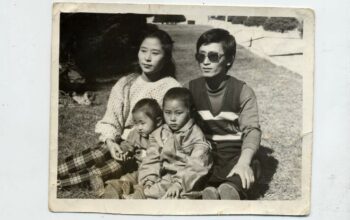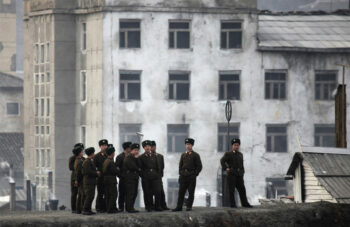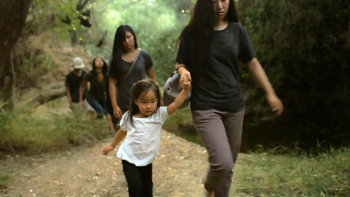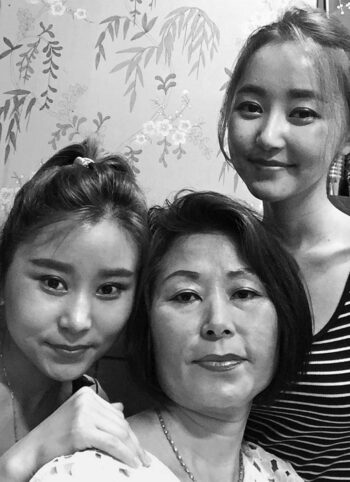
By Michael Ashcraft —
It didn’t even occur to Yeonmi Park to ask why there would be no fee to smuggle her and her mother across the North Korean border into China at night over the frozen Yalu River. Constant hunger smothered that question.
Quickly, she found out why, as the human traffickers immediately demanded sex from the 13-year-old girl, once in China. Her mother stepped in to save her.
“No, you cannot!” Mother shouted. “Take me instead.”
Their desperate escape from North Korea and their entrapment in China’s sex trafficking, followed by their harrowing journey to South Korea and eventual coming to faith, is chronicled in Yeonmi Park’s 2015 book In Order to Live.
Yeonmi’s predicament was devastating. As horrifying as rape was, it was preferable to starvation, so she remained in China. “There was more food in the garbage can than I might see in a week in Hyesan,” Yeonmi says. “I was very happy with my decision.”

Yeonmi Park grew up in Hyesan, North Korea and was taught to revere Great Leader Kim Jong Un. She never questioned the propaganda: North Korea was the most prosperous nation in the world. Kim Jong Un was practically immortal and supremely benevolent. It was the long-nosed Yankees and the Japanese who were evil imperialists destroying the world.
She whole-heartedly believed North Korea’s lies. They were drilled constantly in school and in block meetings in which citizens criticized themselves and others for not obeying the dictator sufficiently.
Never mind that across the river, the Chinese clearly had electricity at night and fireworks during New Year’s while the North Koreans lived in darkness and couldn’t enjoy holiday festivities. Yeonmi, like most North Koreans, never questioned the sincerity of the government or the veracity of their affirmations.
Years later when free, she found in George Orwell’s Animal Farm the term describing her mental state: doublethink. That is how she could watch pirated videos from South Korea and America and, seeing the luxury displayed, still not question Kim Jong Un’s description of reality.
And you could never utter the slightest hint of criticism of the government. You would be overheard and turned in to the state police. “Even the birds and mice can hear you whisper,” mother told her daughters.

“They need to control you through your emotions, making you a slave to the state by destroying your individuality and your ability to react to situations based on your own experience of the world,” Yeonmi writes.
She calls this an “emotional dictatorship.”
All things considered, Yeonmi had it pretty good. Her dad was a smuggler and stole items of value, bribing officials all along the way, to re-sell in the black market.
Then dad got caught, and the family descended into shame and extreme poverty. Mom left Yeonmi and her sister, Eunmi, alone for months at a time while she did her own black-market business to scrounge money for her girls. Dad was condemned to intensive labor in a prison camp that starved inmates so that they died.
“My only adult ambition was to buy as much bread as I liked and eat all of it,” Yeonmi writes. “When you are always hungry, all you think about is food.”
Yeonmi’s older sister eventually found a “broker,” who could smuggle her into China. Yeonmi and her mother followed soon after.

“We never thought to ask why these women were helping us, and why we didn’t have to pay them anything,” Yeonmi says. “We didn’t think that something might be wrong.”
The reason why there were no fees to get spirited across the border is because the smugglers were also sex traffickers. Women were usually sold as slave brides for $2,000, supplying the vacuum of women caused by China’s one-child policy combined with the preference for boys.
Sometimes, they were sold into prostitution.
With resourcefulness, Yeonmi and her mother escaped worse treatment, which was all she could rely on because she couldn’t turn herself in to Chinese authorities; they would only deport her back to the prison camps of North Korea where one might starve to death.
So Yeonmi learned Chinese and fought off her would-be rapists by biting, kicking and screaming. She negotiated with her pimp to be his mistress in return for favors: she bought her mom back from being a “slave bride” and got her dad out of North Korea (though he died of cancer in China not long after).

“I realized that there was a force inside me that would not give up,” she says.
In 2004, China was cracking down on foreigners on its soil in preparation for the Summer Olympics. So, the sex trafficking business dried up. Yeonmi’s pimp let her be taken by a mafia gangster with a harem. It seems that the sex traffickers were particularly pleased to keep her for themselves because of her young age.
Initially, Yeonmi fought the mafia man off when he tried to have his way with her.
“This man had ice in his veins, like a reptile,” she says. I had never met anyone so terrifying. I didn’t escape from North Korea to be this man’s slave, a trophy like something in his jewel collection.”
The man was a sociopath. Since brute force didn’t work, he tried to woo Yeonmi with jewelry, fancy clothes, fine dining and sweet talk. After days of being imprisoned in the gangster harem, Yeonmi decided she would need to use guile to make her escape.

So she faked falling in love. “I made him believe me,” she says.
Having feigned love, she asked permission to go see her mother, which he granted.
When Yeonmi escaped with her mother, she fell into working in a chat room. Other girls stripped for online patrons charged on credit card by the minute, but Yeonmi refused to stoop to such lows. Instead, she offered lonely men sincere conversation. And she was given a portion of the earnings, about $500 a month.
Ultimately her earnings helped pay for her escape from China.
Yeonmi was told of Christian missionaries in Qingdao who helped North Koreans enter Mongolia via the Gobi Desert. There they were granted refugee status and flown to South Korea.
While she was waiting for winter in the missionary’s clandestine shelters, she learned about God for the first time in her life.

“My mother and I had never heard of Jesus Christ,” she says. “One of the other defectors explained it this way: Just think of God as Kim Il Sung and Jesus as Kim Jong Il (Kim Jong Un’s predecessors). Then it makes more sense.”
At first, Yeonmi was only interested in escaping China.
“I was just going along with it at first. If I had to accept Christ as my Savior to get to South Korea, then I was going to be the best Christian these people had ever seen,” she says. “But I had trouble understanding how He was a merciful God. I wondered why God existed in South Korea but not in North Korea.
“Before long, I was swept up in the songs and the spirit of the gospel and lent myself completely to the message of hope,” she says. “I also found I was very good at prayer.
They crossed the Gobi Desert during the coldest part of the year, when temperatures hit negative 27 degrees Fahrenheit. Inclement weather meant there would be fewer police patrols. Yeonmi, her mother and the other North Koreans pretended to be asleep the whole bus ride so that no one would talk to them.
They arrived safely to the tiny, dust-blown town of Erlian where they stayed at a motel before venturing off without their Han Christian guide into the desert in search of the border fence. Later, the Han Christian who guided them to freedom, and the pastor in Qingdao, were caught by police and sent to prison for helping North Koreans escape.
His selflessness impacted Yeonmi. “Why does this person, who doesn’t even speak our language, care so much about us that he is willing to risk his life for us?” she asked. “It moves us to tears. I said a silent prayer of thanks.”
After wandering through the darkness for hours after midnight and fending off a pack of wild animals, they found the border fence and a hole to crawl through. “It was the longest night of my life,” she says. It was 2009. They were in Mongolia — and free.
Or so they thought. A Mongolian soldier approached with his rifle leveled. “Back to China!” he barked.
The refugees had been told to declare they were North Koreans, eligible for asylum. They were baffled that treaties between Mongolia and South Korea meant nothing to the soldiers on the border.
“We’ll die first!” one refugee screamed.
This appeared to frighten the soldiers who relented.

“I was too shattered to remember my prayers,” Yeonmi recalls. “In my mind, I kept repeating, ‘Jesus’ blood is my blood.’ I didn’t know what that meant, but it seemed appropriate, and it was all I could think of to help us survive.”
After the initial shock, the soldiers took the North Koreans to a military compound. They were eventually flown to South Korea.
To her surprise, Yeonmi was interrogated extensively in South Korea. They did this because they screened against North Korean spies who infiltrate refugee groups. “A lot of the questions the agent asked me made me feel very uncomfortable,” Yeonmi says.
Yeonmi was also instructed in the ways of the world: How to use a scanner, printer and an ATM. What was salad, hamburgers and pizza? How to speak South Korean slang known as Konglish? In North Korea, you were told what to think and do, but in South Korea the choices were bewildering.
“It was both mystifying and exhilarating,” she says.
Once released from the center to help refugees transition, Yeonmi had to get caught up with school. She was 15 but had missed so much school due to starvation, she tested into a second-grade level.
In school, she learned what hobbies were and found it strange to use the first person singular pronoun. “Why would anyone care about what ‘I’ wanted to be when I grew up? There was no ‘I’ in North Korea — only ‘we.’”
The schooling is grueling in South Korea. Through a Christian school, Yeonmi got her GED. She was barely accepted to Dongguk University to study criminology. She surprised her professors, who had seen countless North Koreans before her fail.
Starting with the Canadian school in South Korea, Yeonmi began giving talks in English. She spoke in America and Europe. The North Koreans became aware of her and began discrediting her through their national television. The South Korean authorities feared for her safety.
On a trip to America, she improved her English by joining a YWAM mission to certain poor neighborhoods (part of the time was in Costa Rica, so she had to learn Spanish).
Her long-lost sister escaped separately from China and reunited in Seoul.
Eventually Yeonmi immigrated to the United States and studied at Columbia University. She wishes to be a human rights advocate and hosts a vlog about North Korea.
If you want to know more about a personal relationship with God, go here
Reporter Michael Ashcraft is a pastor and a financial professional based in Los Angeles.




[…] “This man had ice in his veins, like a reptile,” she says. I had never met anyone so terrifying. I didn’t escape from North Korea to be this man’s slave, a trophy like something in his jewel collection.” Read the rest: Yeonmi Park on starvation in North Korea vs. sex trafficking in China. […]
In America we have no idea how much people in other countries suffer just to live. How wonderful it is that many of them come to faith in Jesus because Christians are willing to sacrifice so others can be free and have hope of eternal life in heaven. Thank you for the stories. God Bless you in your ministry.
Comments are closed.